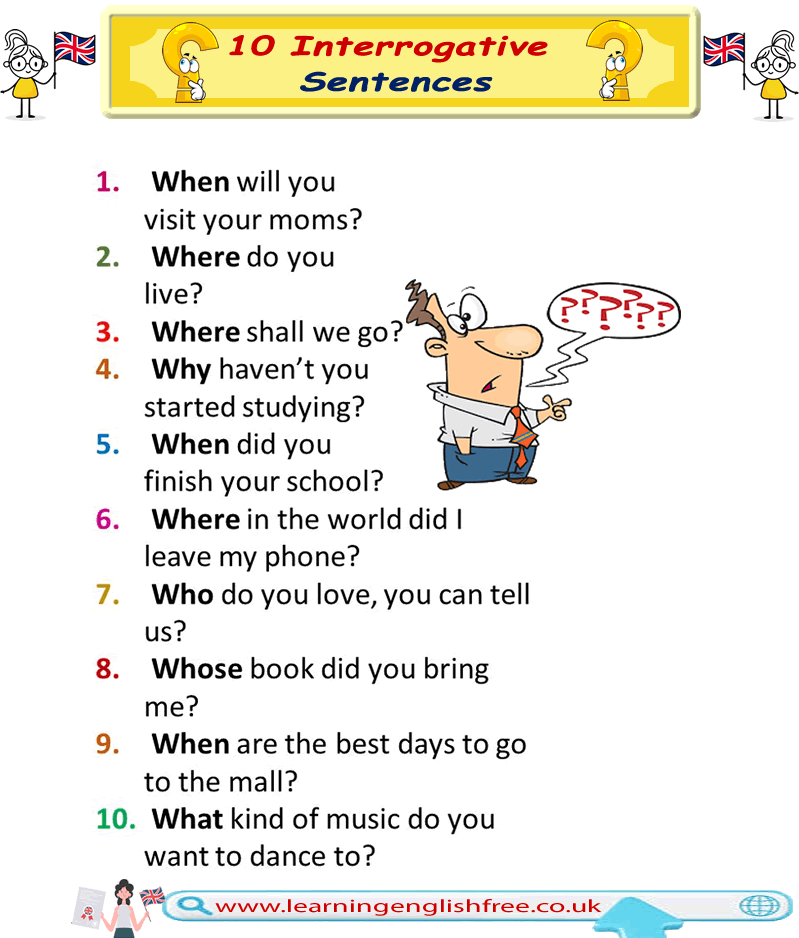
Exploring Interrogative Sentences: A Beginner's Guide
Interrogative sentences are the building blocks of engaging conversations and are essential for learning any new language, especially English. This lesson aims to demystify the use of interrogative sentences for ESL (English as a Second Language) learners, allowing you to ask questions confidently and understand responses more effectively.
Understanding the structure and purpose of interrogative sentences can significantly enhance your communication skills. By the end of this lesson, you will be familiar with different types of interrogative sentences, how to formulate them, and the contexts in which they are used. We will explore various examples to illustrate their practical applications, ensuring that you have a solid grasp of this crucial aspect of English grammar.
Useful Vocabulary for Interrogative Sentences:
- Interrogative Sentence: A sentence that asks a question.
- Wh-questions: Questions that begin with 'who,' 'what,' 'where,' 'when,' 'why,' or 'how.'
- Yes/No questions: Questions that can be answered with a 'yes' or 'no.'
In British English, the use of polite forms and proper punctuation in interrogative sentences is particularly important. This lesson adheres to beginner-friendly language to ensure that the content is accessible to learners at all levels.
Examples of Interrogative Sentences
-
When will you visit your mum's?
- Meaning: Asking for a specific time or date of visit.
- Example: "When will you visit your mum's? I might join you."
-
Where do you live?
- Meaning: Asking for someone's place of residence.
- Example: "Where do you live? I'm new to this town."
-
Where shall we go?
- Meaning: Asking for suggestions on a destination.
- Example: "Where shall we go this weekend? I'm thinking of the beach."
-
Why haven't you started studying?
- Meaning: Asking for the reason behind not beginning to study.
- Example: "Why haven't you started studying? The exam is next week."
-
When did you finish your school?
- Meaning: Asking for the specific time someone completed their schooling.
- Example: "When did you finish your school? We might have attended the same one."
-
Where in the world did I leave my phone?
- Meaning: Expressing confusion or frustration about the location of an item.
- Example: "Where in the world did I leave my phone? I can't find it anywhere!"
-
Who do you love? You can tell us.
- Meaning: Asking about a person's romantic interest.
- Example: "Who do you love? You can tell us, we're your friends."
-
Whose book did you bring me?
- Meaning: Asking about the owner of a book.
- Example: "Whose book did you bring me? It looks interesting."
-
When are the best days to go to the mall?
- Meaning: Asking for advice on the optimal days for a mall visit.
- Example: "When are the best days to go to the mall? I want to avoid the crowd."
-
What kind of music do you want to dance to?
- Meaning: Asking for a preference in music genre.
- Example: "What kind of music do you want to dance to at the party?"
More Examples of Interrogative Sentences
To further enhance your understanding, here are additional examples of interrogative sentences, each with its meaning and usage in a sentence:
-
How often do you exercise?
- Meaning: Asking about the frequency of physical activity.
- Example: "How often do you exercise? I'm trying to set a routine."
-
What's your favorite book?
- Meaning: Asking about a preference in literature.
- Example: "What's your favorite book? I'm looking for recommendations."
-
Who is your role model?
- Meaning: Asking about someone who significantly influences or inspires a person.
- Example: "Who is your role model? I admire Nelson Mandela."
These additional examples illustrate the versatility and utility of interrogative sentences in daily conversations and learning processes.
Summary and Takeaways
Interrogative sentences open doors to knowledge, understanding, and deeper connections in any language, especially in English. Through this lesson, you've embarked on a journey to grasp the essence of asking questions effectively, an indispensable skill in language acquisition and daily communication.
Remember, practice is key to mastering interrogative sentences. Try formulating your questions based on the examples provided, and incorporate them into conversations with peers, teachers, or language partners. This hands-on approach will solidify your understanding and boost your confidence.
To aid retention, visualize the structure of each interrogative sentence, create mind maps of the different types, and use sticky notes around your living space as reminders. Engage with English media, such as films and books, and pay attention to how questions are formed and answered.
Share your learning experience on our platform and visit our Facebook page at www.facebook.com/learningenglishfree.co.uk for more lessons and tips. By engaging with our community, you can find additional support and inspiration. If you have questions or need further assistance, don't hesitate to contact us through our Facebook page.
Your journey to mastering English is ongoing, and each step forward is an achievement. Celebrate your progress, stay curious, and continue to explore the fascinating world of interrogative sentences and beyond.
